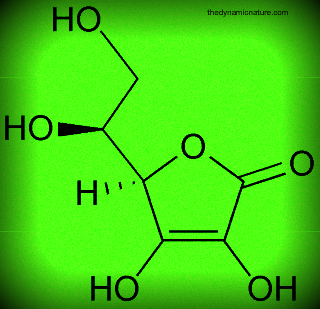vitamin c (ascorbic acid)
Vitamin A Vitamin B complex Vitamin C Vitamin D Vitamin E Vitamin K
Vitamin C (ascorbic acid ) is one of the very essential water-soluble vitamins.
In many animals vitamin C is synthesised
from glucose in their body especially in the liver and the kidneys.
In human beings and other primates vitamin C is not synthesised in the body and
it has to be sourced through their food.
Guinea pigs, certain fruit bats and some birds and fish also cannot synthesise this vitamin in their body.
The chemical formula of vitamin C is C6H8O6.
Insufficiency of vitamin C in humans can cause scurvy which can be life-threatening.
Vitamin C is important for the formation of
collagen, a form of protein, giving structure to blood vessels,
bones, muscles and cartilage.
Collagen is also found in skin, ligaments and scar tissue and is
essential in the healing of injuries and scar tissue.

vitamin C molecule
Vitamin C also helps in the maintenance of bones, teeth and capillaries.
Vitamin C helps in the absorption of iron and its deficiency may cause anaemia.
Vitamin C is a potent antioxidant and it neutralises the free radicals.
It reduces the oxidative stress and protects our body from the
damages caused by the free radicals.
Higher vitamin C intake has been correlated with reduced risk of
gastric cancer<.
A number of benefits have been attributed to high vitamin C intake.
Relief from the symptoms of autism,
slow down of the aging process, protection from arthritis, heart ailments and cancer, lowering of blood
pressure,
and increase in immunity and fertility are some of the benefits.
Deficiency
Scurvy is the result of severe vitamin C deficiency. If left untreated scurvy can be life-threatening.
Scurvy leads to spongy and bleeding gums, bleeding mucous membranes, swelling and pain in joints,
suppurating wounds, follicular hyperkeratosis and hair loss, dryness of the mouth and the eyes,
dry itchy skin and tooth loss.
A person with scurvy suffers from depression and hysteria.
However proper diagnosis and treatment with high doses of vitamin C can reverse the symptoms and improve the health.
Toxicity
High doses of vitamin C can result in intestinal disturbances and diarrhoea.
Sources
Human body cannot synthesise vitamin C and cannot store it.
Hence daily intake is necessary.
Vitamin C is available in fresh leafy vegetables like cabbage and spinach,
fresh fruits like mango, guava and papaya, and all citrus fruits.
Google+ page
By Mahmood Syed Faheem
Advertisement
Disclaimer: Not professional advice - The above content is just for informational & educational purpose only If you need specific medical advice please seek a professional doctor who is licensed or knowledgeable in that area.